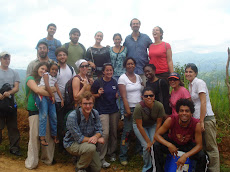Place: Gurabo
Organization: One Respe
Event: Haitian Migrants (Men & Women) Afternoon Meetings
Topic: Human Rights & Spanish Class
While in Gurabo, and while working with One Respe, a few members of our traveling troupe had the opportunity to attend some of the Haitian migrant meetings the organization holds every weeknight. On Monday, the group Nuevo Masculinidad met and spoke about Human Rights. What started off as a conversation about human rights, however, quickly turned into a conversation concerning the importance of documentation for Haitians, especially the working men, while in the Dominican Republic. Out of the entire group, only two men had some sort of Dominican documentation. However, it seems as though it is very difficult to obtain documentation for Haitians working in the DR. The facilitator, one of the members of the health promotion team at One Respe, emphasized the importance of documentation. Without it, their children born on Dominican soil, will not be able to claim their Dominican citizenship, and without citizenship there is no documentation, and without documentation, there are no rights. Towards the end, one man asked us if things were the same in the United States for Haitians. We stated that racism in the US has no national specificity—in American we are all Black. But both Dan and Anthony said we still fight the same struggle and that in the end, we are all in solidarity for the same causes.
It seems, however, that Haitians are in no rush to get documentation from the DR. In fact, the men in the group seemed put off by the idea of being Dominican. If it was their choice, they would be in Haiti, but because they and their families need money, a lot of them saw in the DR opportunities they would not be able to find in Haiti. By the end of the meeting, the facilitator had taken a step back while the men talked more about the injustice that was being done to them in the Dominican Republic.
The animosity towards Dominicans could be seen more so during the Haitian women's Health meeting. During this meeting, Yvranz or Yvonne, headed a Spanish class. It was an effort on the part of One Respe to teach these women some basic Spanish in the case that they need to communicate with others, whether it be in the hospital (a few of them were pregnant and almost all, if not all had children), at the mercado or for transportation services. We listened to a Spanish song and the objective of the exercise was to extract any words they heard that they already knew in Spanish. Yvonne stressed that the women in the group who knew Spanish should help others who knew none at all. However, the conversation turned for the worst when many of the women stood up and exclaimed that it was nearly disrespectful to have to learn the Spanish language, for whatever reason. One woman commented that their children who also attend some of the community schools would come home and speak to them in Spanish. As a result, their parents, especially the fathers, would get angry and punish the child for bringing that language into their household. There seemed to be an underlying current of resentment towards the Dominicans, as evidenced by both these reasons. The conversation soon turned towards the differences between men and women. All of the references were sexual: men have penises, women have menstrual cycles; men don’t have breasts, women get pregnant. One woman even mentioned that without a man, women get no respect, which started up yet another fiery conversation.
Still, these men and women come to these meetings, and so there must be something that continues their interest in attending.
Subscribe to:
Post Comments (Atom)

No comments:
Post a Comment